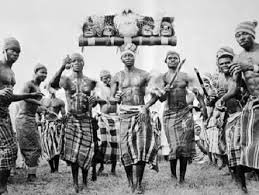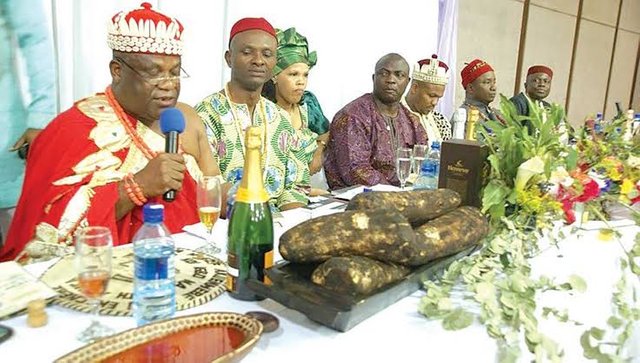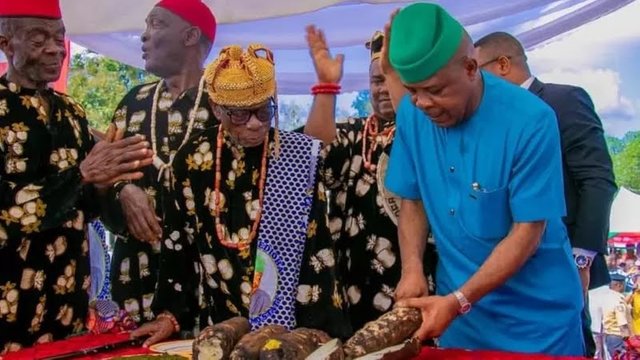Achievement 4 by @luckyrowland | Task: Applying Markdown
.jpeg)
Today I will be writing on achievement number 4 task with the title Applying Markdown. I have successfully completed achievement 1,2,3 task. Let's go straight to the point.I Will be writing about the IGBO TRIBE. I will be using different markdown for this achievement task I am presenting.
Igbo
Home
Geography & Travel
Human Geography
Peoples of Africa
Igbo
people
Alternate titles: Ibo
BY The Editors of Encyclopaedia Britannica | View Edit History
Igbo, also called Ibo, people living chiefly in southeastern Nigeria who speak Igbo, a language of the Benue-Congo branch of the Niger-Congo language family. The Igbo may be grouped into the following main cultural divisions: northern, southern, western, eastern or Cross River, and northeastern. Before European colonization, the Igbo were not united as a single people but lived in autonomous local communities. By the mid-20th century, however, a sense of ethnic identity was strongly developed, and the Igbo-dominated Eastern region of Nigeria tried to unilaterally secede from Nigeria in 1967 as the independent nation of Biafra. By the turn of the 21st century, the Igbo numbered some 20 million.
Nigeria has five igbo states
| S/No. | State | capital |
|---|---|---|
| 01. | Abia | Umuahia |
| 02. | Anambra | Awka |
| 03. | Ebonyi | Abakaliki |
| 04. | Enugu | Enugu |
| 05. | Imo | Owerri |
The Igbo people are descended from Eri, a divine figure who, according to Igbo folklore, was sent from heaven to begin civilization. Another account presents Eri as one of the sons of Gad (as mentioned in the book of Genesis in the Bible) who travelled down to establish the present-day Igboland.
In Nigeria, Igbos inhabit an area referred to as Igboland, which is divided into two sections along the lower River Niger. They live in most or all parts of five states: Abia, Anambra, Ebonyi, Enugu and Imo, as well as minor parts of Delta, Rivers and Benue states. Small Igbo communities are also found in parts of Cameroon and Equitorial Guinea.
As a result of the transatlantic slave trade, Igbos have migrated to other countries including
- Jamaica
- Cuba
- Barbados
- Belize
- United States of America
Elements of Igbo culture have been found in Jamaican patois – for example the Igbo word ‘unu’ which means ‘you’ is still used, while ‘red Ibo‘ or ‘red eboe‘ describes a black person with fairer skin (a lighter skin tone is common among Igbos). A area of Belize City is called Eboe Town after its Igbo-descended inhabitants. Since the late 20th century, many Nigeria immigrants have gone to the United States, and many of them are Igbos. It is estimated that more than 220,000 Igbos live and speak the Igbo language in the United States.
Governance
The Igbo political system differs significantly from most of its West African neighbours. With exception of a few major Igbo communities which have an Obi (king), Igbos have a traditional republican system of government, which is a consultative assembly of people, which guarantees equality to citizens. This system is a departure from the usual form of government with a king ruling over the subjects. Even though there are title holders who are respected by their achievements, they are never revered as kings.
.jpeg)
Many Igbo artefacts were discovered by Thurstan Shaw in 1959 and 1964 at archaeological sites in Igbo-Ukwu, including more than 700 high-quality artefacts of bronze, copper and iron, as well as stone beads, glass and ivory. Igbo bronze artefacts are said to be the oldest in West Africa. Five of the bronze artefacts from the dig are presently in the British Museum.
Occupation
Traditionally, Igbos were mostly farmers, craftsmen and traders – evidence of crafts and metalwork were found in archeological discoveries. A number of the metals used by craftsmen were said to have been from Egypt, providing evidence of trade across the Sahara long before Europeans came to Africa.
Cuisine
The Igbo people’s most important crop is the yam, and it is the reason for the New Yam Festival (Iri Ji) celebrating the harvest of new yams.one of the most popular new yam festival in Igbo land is the (Iri Ji mbaise) meaning the mbaise new yam festival which is celebrated every 15th of August. The yam is also a significant part of a traditional diet and is prepared as pounded yam, eaten with different soups or eaten immediately after being boiled. Igbos are well known for their variety of soups, made from locally grown vegetables, fruits and seeds. The most popular Igbo soups are oha, nsala, akwu, okazi and ofe owerri.
.jpeg)
Religion
The Igbo people have a traditional religious belief that there is one creator, called ‘Chineke’ or ‘Chukwu’. The creator can be approached through many other deities and spirits in the form of natural objects, most commonly through the god of thunder called ‘Amadioha’. Others gods include ‘Ala’, the feminine earth spirit, ‘Anyanwu’ (meaning ‘eye of the sun’) a deity believed to dwell on the sun, and ‘Idemili’, the water goddess whose symbol is that of a python. After Nigeria was colonized, most Igbos (more than 90%) became Christian, which is still the predominant religion today.
Fourth Markdown: Using Bullet
- @steemalive
- @steemfood
- @Steem Skillshare
- @steemafrica
Other Markdown:


You have done well 👍
Hi
Good to see you're on Steemit. Welcome. Achievement task 4 confirmed. Don't forget to follow the Steemit rules. Follow @steemitblog for updates.
Rate 3
Steemit Turkey represantative
Hi, @luckyrowland,
Your post has been supported by @svm038 from the Steem Greeter Team.
5.5% uniqueness of the text
Hello. This is a half-automatic uniqueness check by the content-watch service Please report any inaccuracies The uniqueness of your stat th according to the content-watch.ru service is equal to: 5.5%
The first of the found links with similar text: https://theculturetrip.com/africa/nigeria/articles/an-introduction-to-nigerias-igbo-people/